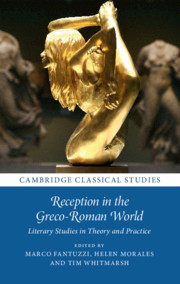Book contents
- Reception in the Greco-Roman World
- Cambridge Classical Studies
- Reception in the Greco-Roman World
- Copyright page
- Dedication
- Contents
- Figures
- Notes on Contributors
- Acknowledgements
- Abbreviations
- Altered States: Cultural Pluralism and Psychosis in Ancient Literary Receptions
- Part I Archaic and Classical Poetics
- Part II Classical Philosophy and Rhetoric, and Their Reception
- Part III Hellenistic and Roman Poetics
- Part IV Multimedia and Intercultural Receptions in the Second Sophistic and Beyond
- References
- Index
Altered States: Cultural Pluralism and Psychosis in Ancient Literary Receptions
Published online by Cambridge University Press: 05 June 2021
- Reception in the Greco-Roman World
- Cambridge Classical Studies
- Reception in the Greco-Roman World
- Copyright page
- Dedication
- Contents
- Figures
- Notes on Contributors
- Acknowledgements
- Abbreviations
- Altered States: Cultural Pluralism and Psychosis in Ancient Literary Receptions
- Part I Archaic and Classical Poetics
- Part II Classical Philosophy and Rhetoric, and Their Reception
- Part III Hellenistic and Roman Poetics
- Part IV Multimedia and Intercultural Receptions in the Second Sophistic and Beyond
- References
- Index
Summary
Why speak of ‘reception’ in classical antiquity, rather than ‘allusion’ or ‘intertextuality’? This chapter begins by assessing the reasons for the emergence of the term reception in the scholarship of the last thirty years, identifying (a) a shift away from unilateral models of ‘influence’; (b) a postmodern promotion of the status of the ‘copy’; (c) a pedagogical need for multiplication of access points into the ancient world. But the idea of ‘reception’ has been applied primarily to post-antique cultures: why? Speaking of reception helps us break down the idea that antiquity itself was sealed off from later cultures, and that it was a homogeneous monoculture through which a single, cohesive tradition ran. It puts the emphasis on discontinuity, and the specificity and idiosyncrasy of each act of receiving; such acts can therefore be understood as ‘theorisations’ of the idea of tradition. This approach to literary history creates an equivalence between all receptions, however apparently ‘central’ or ‘marginal’. It also spotlights the political embeddedness and materiality of each act of reception. The chapter closes by considering how the volume’s contributions further this agenda.
- Type
- Chapter
- Information
- Reception in the Greco-Roman WorldLiterary Studies in Theory and Practice, pp. 1 - 20Publisher: Cambridge University PressPrint publication year: 2021

